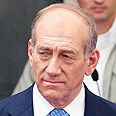
Senior source: IDF to withdraw in week or two
Government expected Sunday to okay Security Council Resolution 1701 to end fighting in southern Lebanon. Senior source at PM's Office estimates in conversation with Ynet that soldiers' withdrawal will only begin when multinational force, Lebanese soldiers arrive
From the moment a decision is made to leave, the withdrawal will be very quick, due to the estimation that Hizbullah will try and attack the IDF and cause additional losses.
The Lebanese government on Saturday unanimously accepted the Security Council decision. A Lebanese minister on behalf of Hizbullah said that he and another of the organization's ministers had reservations over the agreement.
According to the minister, "we mainly opposed the part in the decision which acquits Israel of responsibility for the crimes it committed, and accuses Hizbullah of the war."
A series of discussions was held in Jerusalem over the weekend, in which the possible scenarios for a ceasefire were discussed. The ceasefire will come into force by Monday morning. The instruction on the exact time for the start of the ceasefire will be apparently given to both sides simultaneously by UN Secretary-General Kofi Annan.
In the cabinet meeting, Prime Minister Ehud Olmert is expected to present the agreement reached in the Security Council's decision and the way it was reached. The government secretariat distributed over the weekend copies of the decision in Hebrew and English to all the ministers.
After the prime minister's briefing, a discussion will be held in which the ministers will express their opinion. Officials at the Prime Minister's Office do not expect any real opposition to the ceasefire agreement according to the Security Council decision.
Sources at the Prime Minister's Office made in clear on Saturday night that the ceasefire does not prevent Israel of the right to defend its citizens and its forces, which will continue to stay in Lebanon until the multinational force arrives.
In the coming week or two, IDF forces are expected to take up the improved positions they will reach until the ceasefire, prepared to prevent launchings of Katyusha rockets and missiles and defend themselves.
"In a case where there is information on a Hizbullah force threatening the citizens or soldiers of Israel, we are maintaining the right to respond first," the senior source at the Prime Minister's Office clarified.
During the cabinet meeting, in which an IDF representative will review the development of the military operation in Lebanon. The IDF will also reports how it is preparing for the implementation of the ceasefire agreement in light of the large number of casualties in Lebanon and the fear that Hizbullah will prepare for a last effort to hurt Israeli soldiers.
The prime minister will ask the defense minister and the IDF to prepare an operative plan for defending the forces, while waiting for the Lebanese army and the multinational force. In addition, he will ask them to present in the next few days a plan for a quick withdrawal, in order to prevent Hizbullah from causing more casualties among IDF soldiers.
Developing military plan
A senior military source said that the IDF's operation on Lebanon's territory do not completely correlate the original plan of the fighting.
According to the source, "the plans were slightly different, but this is a developing plan."
The source also referred to the wide-scale ground operation in southern Lebanon, saying that this was an attempt to reach the rocket launchers and choke the "fighting unit, which is Hizbullah's operational heart."
According to the source, "this is the area of the Nasser unit. They are in fact operating almost everything – the anti-tank groups, the anti-aircraft, fighters, and of course the 122mm Katyusha launchers. We already killed 550 terrorists from the unit, and we will know the exact numbers after the war."
"We know that in total they have 1,000-1,500 compulsory soldiers, and thousands of reserve soldiers who they have already began calling up. Those we have encountered so far were compulsory soldiers, and one can tell that they are tired, hungry, and in distress. They go out to look for food and expose themselves," he said.
As for the IDF's operation in southern Lebanese villages, the source said that "every village is like a military camp, and even more. In one of the villages were fire at a suspicious house and hear a series of bombings for 24 hours afterwards. It is unbelievable how much ammunition they have collected."
Miri Chason contrinuted to the report










